仁爱英语八下Unit 7 Food festival Topic 3 I Cooked the Most Successfully复习课件(共27张PPT)
文档属性
| 名称 | 仁爱英语八下Unit 7 Food festival Topic 3 I Cooked the Most Successfully复习课件(共27张PPT) |

|
|
| 格式 | zip | ||
| 文件大小 | 3.6MB | ||
| 资源类型 | 教案 | ||
| 版本资源 | 仁爱科普版 | ||
| 科目 | 英语 | ||
| 更新时间 | 2020-04-22 00:00:00 | ||
图片预览

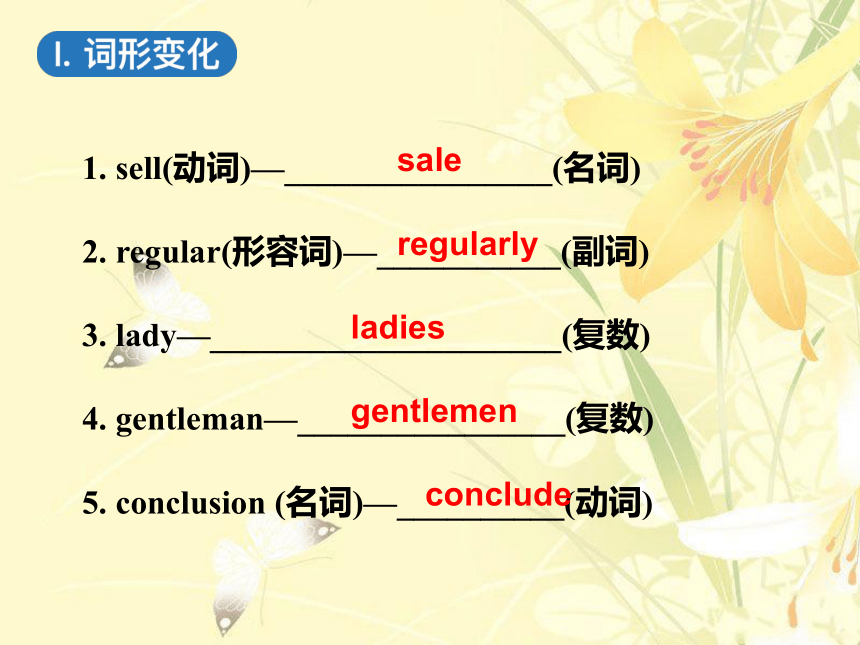
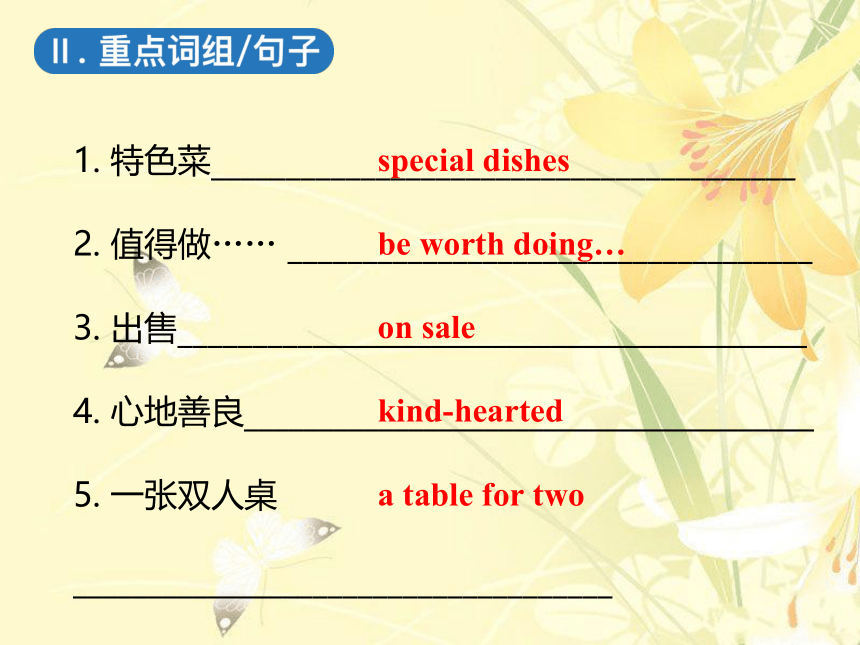


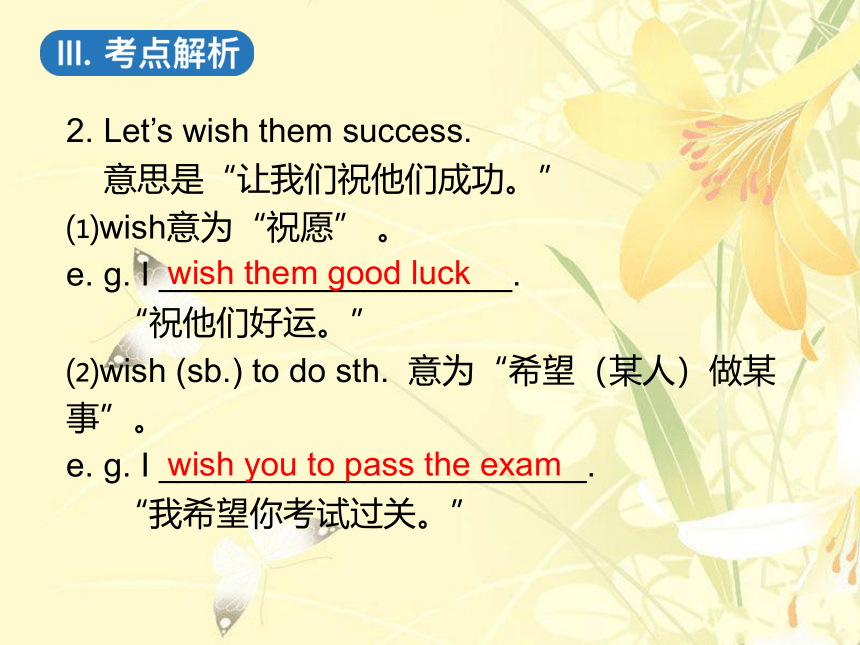
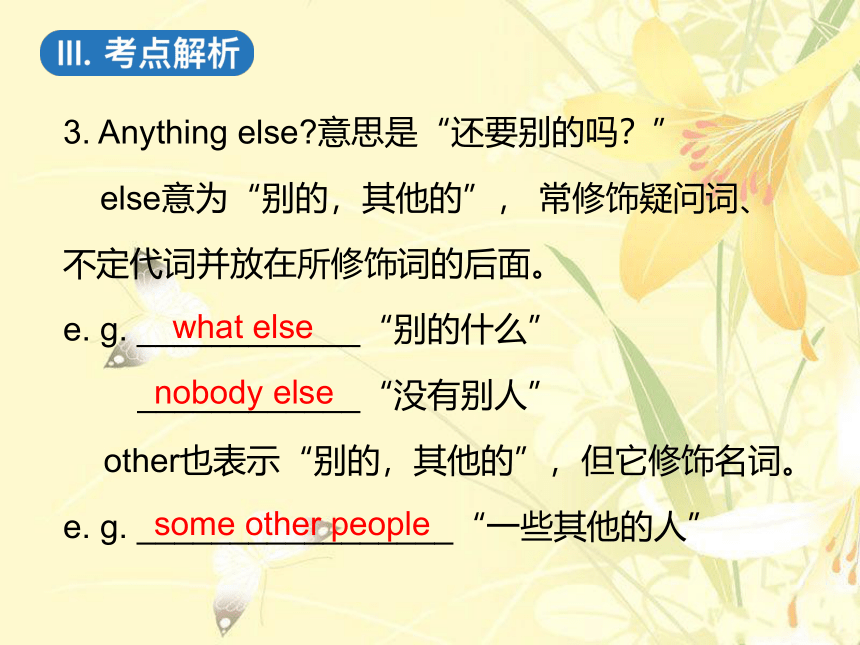
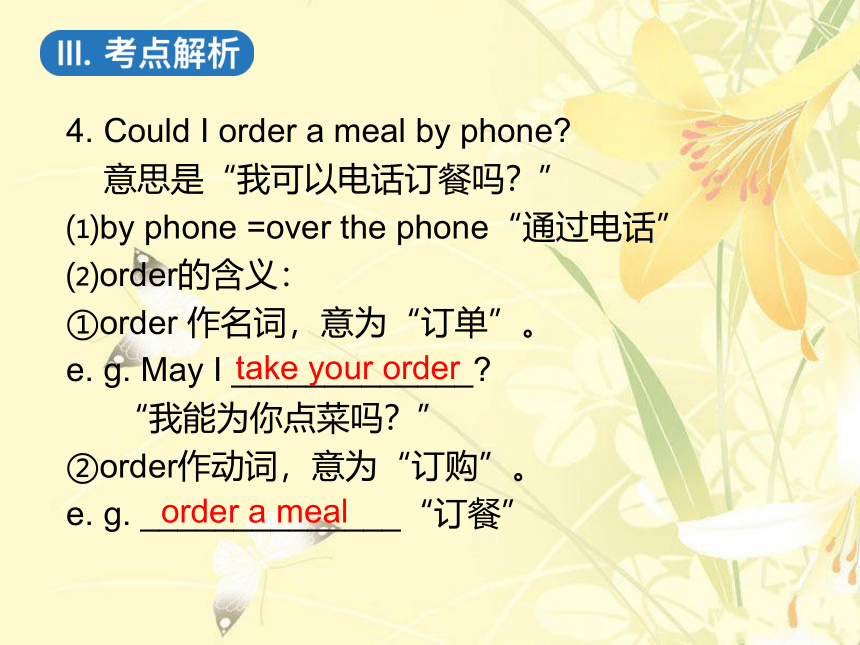
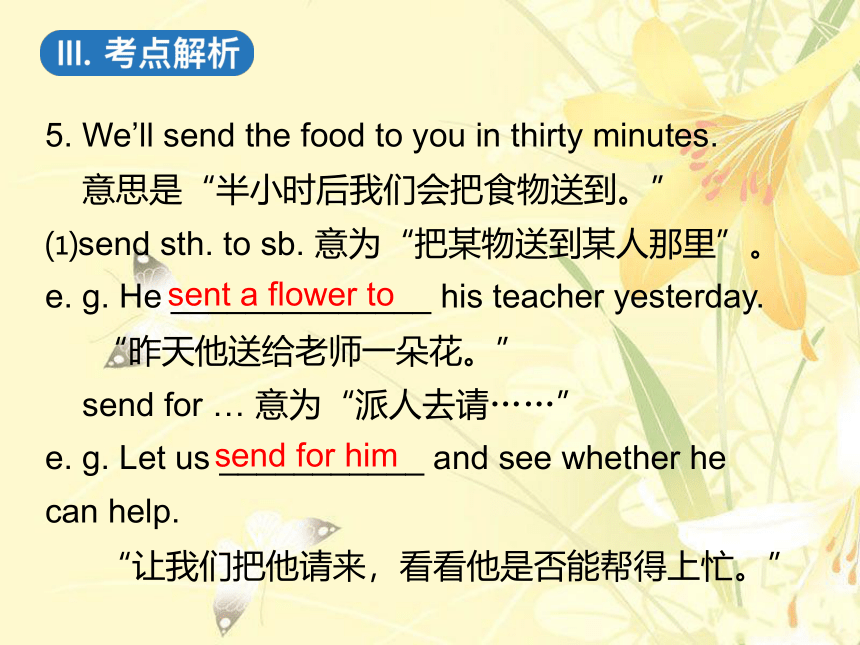
文档简介
(共27张PPT)
八年级下册 U7T3复习
1. sell(动词)—________________(名词) 2. regular(形容词)—___________(副词)
3. lady—_____________________(复数) 4. gentleman—________________(复数)
5. conclusion (名词)—__________(动词)
sale
regularly
ladies
gentlemen
conclude
1. 特色菜_______________________________________
2. 值得做…… ___________________________________
3. 出售__________________________________________
4. 心地善良______________________________________
5. 一张双人桌____________________________________
special dishes
be worth doing…
on sale
kind-hearted
a table for two
6. 结账,付账____________________________________
7. 以正确的方式_________________________________
8. 主食,主菜___________________________________
9. 据说__________________________________________
10. 三十分钟后__________________________________
have the bill/get the bill/pay the bill
in a right way
main course
It’s said that…
in thirty minutes
1. Enjoy yourselves!
意思是“祝你们玩得开心!”
enjoy oneself相当于have a good/nice/great/
wonderful time,还可以表述为have fun。
2. Let’s wish them success.
意思是“让我们祝他们成功。”
⑴wish意为“祝愿” 。
e. g. I ___________________.
“祝他们好运。”
⑵wish (sb.) to do sth. 意为“希望(某人)做某事”。
e. g. I _______________________.
“我希望你考试过关。”
wish them good luck
wish you to pass the exam
3. Anything else?意思是“还要别的吗?”
else意为“别的,其他的”, 常修饰疑问词、不定代词并放在所修饰词的后面。
e. g. ____________“别的什么”
____________“没有别人”
other也表示“别的,其他的”,但它修饰名词。
e. g. _________________“一些其他的人”
what else
nobody else
some other people
4. Could I order a meal by phone?
意思是“我可以电话订餐吗?”
⑴by phone =over the phone“通过电话”
⑵order的含义:
①order 作名词,意为“订单”。
e. g. May I _____________?
“我能为你点菜吗?”
②order作动词,意为“订购”。
e. g. ______________“订餐”
take your order
order a meal
5. We’ll send the food to you in thirty minutes.
意思是“半小时后我们会把食物送到。”
⑴send sth. to sb. 意为“把某物送到某人那里”。
e. g. He ______________ his teacher yesterday.
“昨天他送给老师一朵花。”
send for … 意为“派人去请……”
e. g. Let us ___________ and see whether he can help.
“让我们把他请来,看看他是否能帮得上忙。”
sent a flower to
send for him
⑵“in +一段时间”,表示“……之后”,用于一般将来时,用 how soon提问。
e. g. ( )—______ will summer vacation come?
—It will come in a month.
A. How soon
B. How long
C. How often
A
6. The first International Food Festival went very well, and the results were worth the effort.
意思是“第一届国际美食节进展得非常顺利,我们的付出得到了回报。”
⑴go well 意为“进展顺利”。
______________________一切进展顺利吗?
⑵worth意为“值……的,有……的价值的”等,常常用作形容词,在句中一般作表语。常用于句式“…be worth doing”。此时,句子的主语就是worth之后v.-ing形式的逻辑宾语。
Does everything go well?
一般来说,worth前面可用well, really, very much, hardly, easily等词语修饰,但一般不单独用very修饰。
“be worth+钱”意为“值……钱”。
“be worth+(doing) sth. ” 意为“值得做某事”。
e. g. The book is worth ________(read).
“这本书值得看。”
reading
7. In short, we should not only eat enough food, healthy food but also eat it regularly.
意思是“总之, 我们不仅应该吃足够好的、健康的食品,而且饮食要有规律。”
“not only…but also…”意为“不但……而且……”,它连接两个并列成分,可以是单词、短语或句子。当它连接并列主语时,要注意谓语动词常与靠最近的主语在人称和数方面保持一致,这就是主谓“就近原则”。结构中的also有时可以省略。
e. g. Not only he but also I _____(be) a student.
“不但他是学生,我也是。”
am
运用《连接中考》P84的功能意念句完成下面的情景交际:
1. 购物结账时服务员找钱给你,他可能会这么说:
___________________.
2. 你想电话订餐,你可以这么说:
___________________________________________.
3. 有女生打电话找你哥,你去告诉你哥前可以对她这样说:
________________________________________.
Here’s your change
I’d like to order a meal by phone/over the phone
Hold on, please/Wait a moment/Just a minute
4. 作为一名服务生,你想请客人点菜时可以这么说:
_________________________________________?
5. 用餐完毕你想结账,你可以这么对服务生说:
__________________________________?
6. 客人点了一份主食和一份饮料,你想知道他是否还要点些别的什么,你可以这么问:
________________________________________?
May I take your order/Are you ready to order
May I have/look at the/my bill, please
Any thing else/Would you like anything else
副词比较等级的构成及用法 1. 副词比较级和最高级的变化规则:
单音节词和少数双音节词 构成规则 词尾加er
或est 以e结尾的词加r或st 以辅音字母加y结尾的词改y为i,再加er或est.
例词 fast
faster
fastest late
later
latest early
earlier
earliest
多音节词和部分双音节词 构成规则 在词前加more或most
例词 slowly
more slowly
most slowly carefully
more carefully
most carefully
少数不规则副词的变化形式
原级 well many/much ill/badly little far
比较级 better more worse less farther/further
最高级 best most worst least farthest/furthest
2. 副词比较等级的用法:
⑴同级比较:表示两者在某一方面程度相同时,用“as +副词原形+ as”的句式; 表示前者不如后者时,用“not so (as) +副词原形+ as”的句式。
e. g. The boys are listening _____________ the girls.
“男生们跟女生们在一样认真地听着。”
He didn’t dance _____________ Jim.
“他跳舞不如吉姆跳得好。”
as carefully as
so (as) well as
⑵比较级:表示一方程度比另一方更高时,用“副词比较级+than”的句式。在这一句式中,当than前后的动词相同时,通常用助动词代替后面的动词。该动词或助动词可以省略。副词比较级前常用even,still,a lot, far, much, a little等修饰。表示“更……”,这也可以作为判断比较级的依据。
e. g. I sing ______(good) than she (does).
“我唱歌比她唱得好。”
better
⑶最高级:表示三个或三个以上的人或物的比较时,用副词最高级。结构为“the +副词最高级+比较范围”,其中的the常省去,比较范围常用of或in短语。
e. g. Maria speaks English (the) _____(good) in our class. “在我们班上,玛丽亚英语讲得最好。”
⑷表示“越……越……”时用“the +副词比较级,the +形容(副)词比较级”。
e. g. The _____________(regularly) we eat, the _________(healthy) we are.
“我们吃得越有规律,我们就越健康。”
best
more regularly
healthier
⑸学习副词的比较级和最高级应注意以下情况:
①副词的比较级和最高级之间常进行同义转换。
e. g. Jane speaks English best in her class.
=Jane speaks English better than any other student.
“简在班上英语说得最好。”
Bill runs faster than Jack.
= Jack doesn’t run so fast as Bill.
“比尔跑得比杰克快。”
②副词最高级转换成比较级时,被比较的对象应用“any other+单数名词”或“the other+复数名词”,排除主语本身。
e. g. Mark works hardest in his class.
“马克是他班上学习最努力的(学生)。”
= Mark works harder than _________ student in his class.
= Mark works harder than _________ students in his class.
any other
the other
八年级下册 U7T3复习
1. sell(动词)—________________(名词) 2. regular(形容词)—___________(副词)
3. lady—_____________________(复数) 4. gentleman—________________(复数)
5. conclusion (名词)—__________(动词)
sale
regularly
ladies
gentlemen
conclude
1. 特色菜_______________________________________
2. 值得做…… ___________________________________
3. 出售__________________________________________
4. 心地善良______________________________________
5. 一张双人桌____________________________________
special dishes
be worth doing…
on sale
kind-hearted
a table for two
6. 结账,付账____________________________________
7. 以正确的方式_________________________________
8. 主食,主菜___________________________________
9. 据说__________________________________________
10. 三十分钟后__________________________________
have the bill/get the bill/pay the bill
in a right way
main course
It’s said that…
in thirty minutes
1. Enjoy yourselves!
意思是“祝你们玩得开心!”
enjoy oneself相当于have a good/nice/great/
wonderful time,还可以表述为have fun。
2. Let’s wish them success.
意思是“让我们祝他们成功。”
⑴wish意为“祝愿” 。
e. g. I ___________________.
“祝他们好运。”
⑵wish (sb.) to do sth. 意为“希望(某人)做某事”。
e. g. I _______________________.
“我希望你考试过关。”
wish them good luck
wish you to pass the exam
3. Anything else?意思是“还要别的吗?”
else意为“别的,其他的”, 常修饰疑问词、不定代词并放在所修饰词的后面。
e. g. ____________“别的什么”
____________“没有别人”
other也表示“别的,其他的”,但它修饰名词。
e. g. _________________“一些其他的人”
what else
nobody else
some other people
4. Could I order a meal by phone?
意思是“我可以电话订餐吗?”
⑴by phone =over the phone“通过电话”
⑵order的含义:
①order 作名词,意为“订单”。
e. g. May I _____________?
“我能为你点菜吗?”
②order作动词,意为“订购”。
e. g. ______________“订餐”
take your order
order a meal
5. We’ll send the food to you in thirty minutes.
意思是“半小时后我们会把食物送到。”
⑴send sth. to sb. 意为“把某物送到某人那里”。
e. g. He ______________ his teacher yesterday.
“昨天他送给老师一朵花。”
send for … 意为“派人去请……”
e. g. Let us ___________ and see whether he can help.
“让我们把他请来,看看他是否能帮得上忙。”
sent a flower to
send for him
⑵“in +一段时间”,表示“……之后”,用于一般将来时,用 how soon提问。
e. g. ( )—______ will summer vacation come?
—It will come in a month.
A. How soon
B. How long
C. How often
A
6. The first International Food Festival went very well, and the results were worth the effort.
意思是“第一届国际美食节进展得非常顺利,我们的付出得到了回报。”
⑴go well 意为“进展顺利”。
______________________一切进展顺利吗?
⑵worth意为“值……的,有……的价值的”等,常常用作形容词,在句中一般作表语。常用于句式“…be worth doing”。此时,句子的主语就是worth之后v.-ing形式的逻辑宾语。
Does everything go well?
一般来说,worth前面可用well, really, very much, hardly, easily等词语修饰,但一般不单独用very修饰。
“be worth+钱”意为“值……钱”。
“be worth+(doing) sth. ” 意为“值得做某事”。
e. g. The book is worth ________(read).
“这本书值得看。”
reading
7. In short, we should not only eat enough food, healthy food but also eat it regularly.
意思是“总之, 我们不仅应该吃足够好的、健康的食品,而且饮食要有规律。”
“not only…but also…”意为“不但……而且……”,它连接两个并列成分,可以是单词、短语或句子。当它连接并列主语时,要注意谓语动词常与靠最近的主语在人称和数方面保持一致,这就是主谓“就近原则”。结构中的also有时可以省略。
e. g. Not only he but also I _____(be) a student.
“不但他是学生,我也是。”
am
运用《连接中考》P84的功能意念句完成下面的情景交际:
1. 购物结账时服务员找钱给你,他可能会这么说:
___________________.
2. 你想电话订餐,你可以这么说:
___________________________________________.
3. 有女生打电话找你哥,你去告诉你哥前可以对她这样说:
________________________________________.
Here’s your change
I’d like to order a meal by phone/over the phone
Hold on, please/Wait a moment/Just a minute
4. 作为一名服务生,你想请客人点菜时可以这么说:
_________________________________________?
5. 用餐完毕你想结账,你可以这么对服务生说:
__________________________________?
6. 客人点了一份主食和一份饮料,你想知道他是否还要点些别的什么,你可以这么问:
________________________________________?
May I take your order/Are you ready to order
May I have/look at the/my bill, please
Any thing else/Would you like anything else
副词比较等级的构成及用法 1. 副词比较级和最高级的变化规则:
单音节词和少数双音节词 构成规则 词尾加er
或est 以e结尾的词加r或st 以辅音字母加y结尾的词改y为i,再加er或est.
例词 fast
faster
fastest late
later
latest early
earlier
earliest
多音节词和部分双音节词 构成规则 在词前加more或most
例词 slowly
more slowly
most slowly carefully
more carefully
most carefully
少数不规则副词的变化形式
原级 well many/much ill/badly little far
比较级 better more worse less farther/further
最高级 best most worst least farthest/furthest
2. 副词比较等级的用法:
⑴同级比较:表示两者在某一方面程度相同时,用“as +副词原形+ as”的句式; 表示前者不如后者时,用“not so (as) +副词原形+ as”的句式。
e. g. The boys are listening _____________ the girls.
“男生们跟女生们在一样认真地听着。”
He didn’t dance _____________ Jim.
“他跳舞不如吉姆跳得好。”
as carefully as
so (as) well as
⑵比较级:表示一方程度比另一方更高时,用“副词比较级+than”的句式。在这一句式中,当than前后的动词相同时,通常用助动词代替后面的动词。该动词或助动词可以省略。副词比较级前常用even,still,a lot, far, much, a little等修饰。表示“更……”,这也可以作为判断比较级的依据。
e. g. I sing ______(good) than she (does).
“我唱歌比她唱得好。”
better
⑶最高级:表示三个或三个以上的人或物的比较时,用副词最高级。结构为“the +副词最高级+比较范围”,其中的the常省去,比较范围常用of或in短语。
e. g. Maria speaks English (the) _____(good) in our class. “在我们班上,玛丽亚英语讲得最好。”
⑷表示“越……越……”时用“the +副词比较级,the +形容(副)词比较级”。
e. g. The _____________(regularly) we eat, the _________(healthy) we are.
“我们吃得越有规律,我们就越健康。”
best
more regularly
healthier
⑸学习副词的比较级和最高级应注意以下情况:
①副词的比较级和最高级之间常进行同义转换。
e. g. Jane speaks English best in her class.
=Jane speaks English better than any other student.
“简在班上英语说得最好。”
Bill runs faster than Jack.
= Jack doesn’t run so fast as Bill.
“比尔跑得比杰克快。”
②副词最高级转换成比较级时,被比较的对象应用“any other+单数名词”或“the other+复数名词”,排除主语本身。
e. g. Mark works hardest in his class.
“马克是他班上学习最努力的(学生)。”
= Mark works harder than _________ student in his class.
= Mark works harder than _________ students in his class.
any other
the other
同课章节目录
- Unit 5 Feeling excited
- Topic 1 You look excited
- Topic 2 I’m feeling better now.
- Topic 3 Many things can affect our feelings.
- Unit 6 Enjoying Cycling
- Topic 1 We're going on a three-day visit to Mount
- Topic 2 How about exploring Tian’anmen Square?
- Topic 3 Bicycle riding is good exercise.
- Unit 7 Food festival
- Topic 1 We’re preparing for a food festival.
- Topic 2 I’m not sure whether I can cook it well.
- Topic 3 I Cooked the Most Successfully
- Unit 8 Our Clothes
- Topic 1 We will have a class fashion show.
- Topic 2 We can design our own uniforms.
- Topic 3 He said the fashion show was wonderful.
